rongsheng cease shipbuilding brands
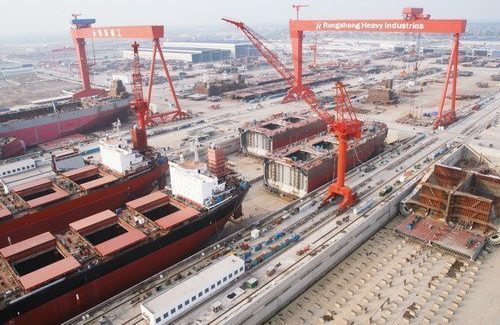
RUGAO, China/SINGAPORE (Reuters) - Deserted flats and boarded-up shops in the Yangtze river town of Changqingcun serve as a blunt reminder of the area"s reliance on China Rongsheng Heavy Industries Group, the country"s biggest private shipbuilder.A view of the Rongsheng Heavy Industries shipyard is seen in Nantong, Jiangsu province December 4, 2013. REUTERS/Aly Song
The shipbuilder this week predicted a substantial annual loss, just months after appealing to the government for financial help as it reeled from industry overcapacity and shrinking orders. Rongsheng lost an annual record 572.6 million yuan ($92 million) last year, and lost 1.3 billion yuan in the first half of this year.
While Beijing seems intent to promote a shift away from an investment-heavy model, with companies reliant on government cash injections, some analysts say Rongsheng is too big for China to let fail.
Local media reported in July that Rongsheng had laid off as many as 8,000 workers as demand slowed. Three years ago, the company had about 20,000 staff and contract employees. This week, the shipbuilder said an unspecified number of workers had been made redundant this year.
“Without new orders it’s hard to see how operations can continue,” said one worker wearing oil-spattered overalls and a Rongsheng hardhat, adding he was still waiting to be paid for September. He didn’t want to give his name as he feared he could lose his job.
“Morale in the office is quite low, since we don’t know what is the plan,” said a Rongsheng executive, who declined to be named as he is not authorized to speak to the media. “We have been getting orders but can’t seem to get construction loans from banks to build these projects.”
While Rongsheng has won just two orders this year, state-backed rival Shanghai Waigaoqiao Shipbuildinghas secured 50, according to shipbroker data. Singapore-listed Yangzijiang Shipbuildinghas won more than $1 billion in new orders and is moving into offshore jack-up rig construction, noted Jon Windham, head industrials analyst at Barclays in Hong Kong.
Frontline, a shipping company controlled by Norwegian business tycoon John Fredriksen, ordered two oil tankers from Rongsheng in 2010 for delivery earlier this year. It now expects to receive both of them in 2014, Frontline CEO Jens Martin Jensen told Reuters.
Greek shipowner DryShips Inchas also questioned whether other large tankers on order will be delivered. DryShips said Rongsheng is building 43 percent of the Suezmax vessels - tankers up to 200,000 deadweight tons - in the current global order book. That"s equivalent to 23 ships, according to Rongsheng data.
Speaking at a quarterly results briefing last month, DryShips Chief Financial Officer Ziad Nakhleh said Rongsheng was “a yard that, as we stated before, is facing difficulties and, as such, we believe there is a high probability they will not be delivered.” DryShips has four dry cargo vessels on order at the Chinese firm.
Rongsheng declined to comment on the Dryships order, citing client confidentiality. “For other orders on hand, our delivery plan is still ongoing,” a spokesman said.
At least two law firms in Shanghai and Singapore are acting for shipowners seeking compensation from Rongsheng for late or cancelled orders. “I’m now dealing with several cases against Rongsheng,” said Lawrence Chen, senior partner at law firm Wintell & Co in Shanghai.
Billionaire Zhang Zhirong, who founded Rongsheng in 2005 and is the shipyard"s biggest shareholder, last month announced plans to privatize Hong Kong-listed Glorious Property Holdingsin a HK$4.57 billion ($589.45 million) deal - a move analysts said could raise money to plug Rongsheng"s debts.
Meanwhile, Rongsheng’s shipyard woes have already pushed many people away from nearby centers, and others said they would have to go if things don’t pick up. Some said they hoped the local government might step in with financial support.
The Rugao government did not respond to requests for comment on whether it would lend financial or other support to Rongsheng. Annual reports show Rongsheng has received state subsidies in the past three years.
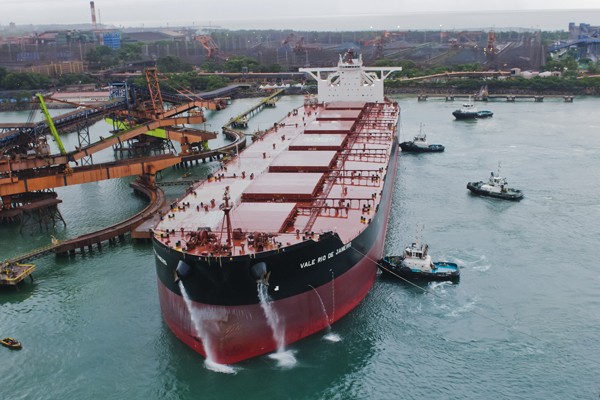
HONG KONG, July 5 (Reuters) - China Rongsheng Heavy Industries Group, China’s largest private shipbuilder, appealed for financial help from the Chinese government and big shareholders on Friday after cutting its workforce and delaying payments to suppliers.
Analysts said the company could be the biggest casualty of a local shipbuilding industry suffering from overcapacity and shrinking orders amid a global shipping downturn. New ship orders for Chinese builders fell by about half last year.
Hours after China Rongsheng made its appeal in a filing to the Hong Kong stock exchange, where the company is listed, Beijing vowed to bring about the orderly closure of some factories in industries plagued by overcapacity.
The statement by the State Council, or cabinet, laid out broad plans to ensure banks support the kind of economic rebalancing Beijing wants as it looks to focus more on high-end manufacturing. It did not mention any specific industries or companies and there was no suggestion it was referring to Rongsheng.
China Rongsheng said it was expecting a net loss for the six months that ended June 30 from a year earlier, according to the filing. It gave no figures.
Rongsheng shares plunged 16 percent to a record low in heavy turnover on Friday, leaving its market capitalisation at just under $1 billion. The Hang Seng Index climbed 1.9 percent. China Rongsheng is down 28.2 percent on the year.
In its filing, China Rongsheng said some workers had been made redundant, although it gave no numbers or timeframe for the losses. The company did not immediately respond to requests for more information.
China Rongsheng has said it won only two shipbuilding orders worth $55.6 million last year when its target was $1.8 billion worth of contracts. This year, it received orders to build two drilling rigs used in oil exploration, worth $360 million.
By contrast, another Chinese shipbuilder, Singapore-listed Yangzijiang Shipbuilding (Holdings) Ltd, has secured total orders of $1 billion in the first half, Barclays said.
While the Chinese shipbuilding industry faced “unprecedented challenges”, China Rongsheng’s board was confident management could ease pressure on working capital in the near future and maintain normal operations, the company said in the filing.
According to its December 2012 annual report, issued on March 26, China Rongsheng’s cash and cash equivalents fell to 2.1 billion yuan from 6.3 billion yuan a year ago.
“The group is ... actively seeking financial support from the government and the substantial shareholders of the company, and increasing its efforts in negotiations with its customers to maximise the collection of receivables,” China Rongsheng said in the filing.
A note from Macquarie Equities research said the statement highlighted the “severity” of China Rongsheng’s liquidity problems, adding this was not necessarily representative of the wider sector.
It said other listed Chinese shipyards were not as leveraged as China Rongsheng. The loan from Zhang was a surprise, it said, showing how badly the company needed cash.
“Rongsheng will need to address the problems immediately to reassure the market,” said Martin Rowe, managing director of Clarkson Asia Limited, a global shipping services provider.
The Chinese government has been trying to support the domestic shipping industry since the 2008 financial crisis, and local media reports said this week Beijing was considering policies to revive the shipbuilding business.
The holding orders of Chinese shipyards dropped 23 percent in the first five months of this year compared with a year earlier, according to the China Association of the National Shipbuilding Industry. New orders dropped to a seven-year low in 2012. ($1=6.1258 yuan) (Additional reporting by Yimou Lee and Twinnie Siu in Hong Kong and Keith Wallis in Singapore; Editing by Dean Yates)
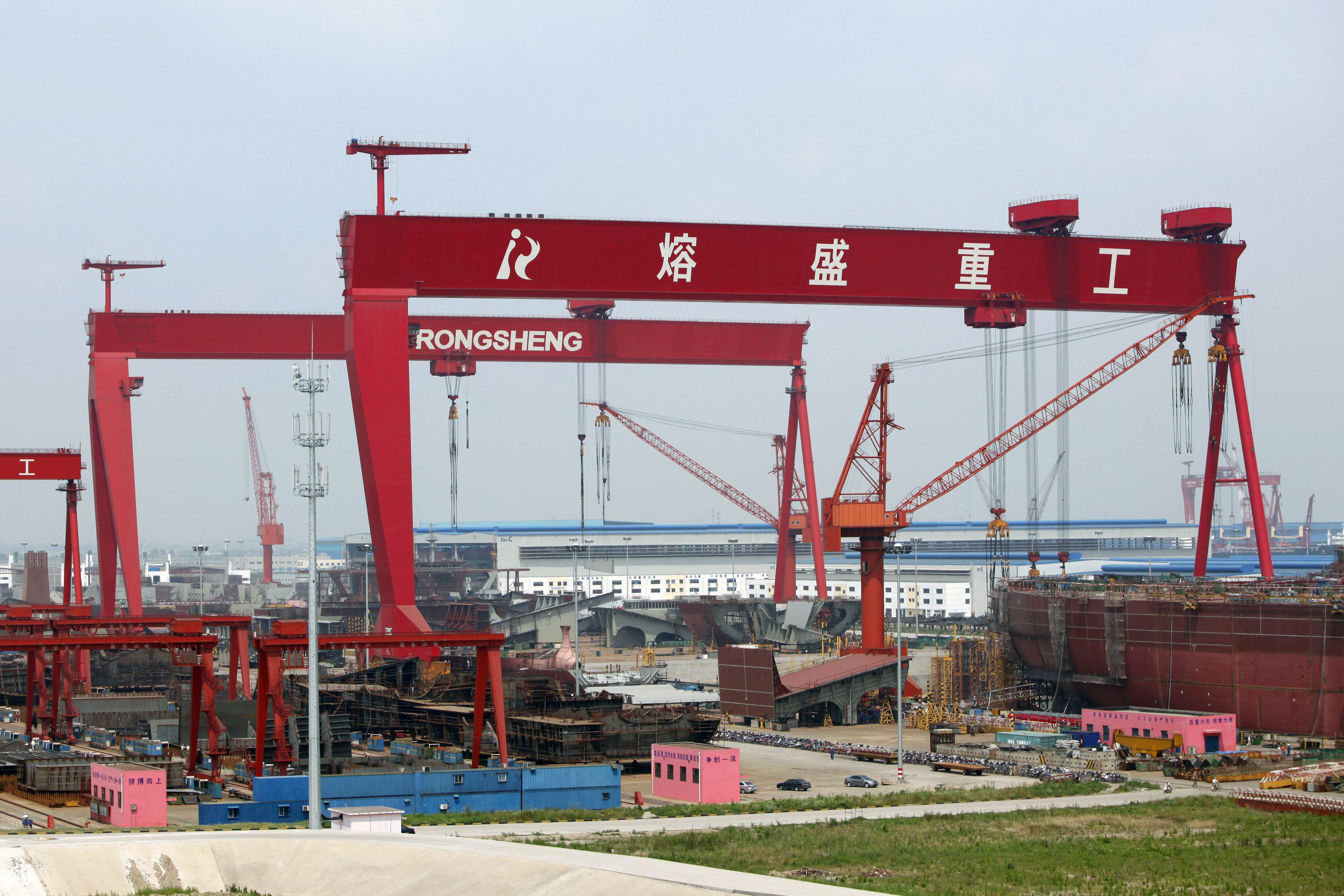
Shanghai: Founder and former chairman of Jiangsu Rongsheng Heavy Industries Group, Zhang Zhirong, has said the shipyard’s failure is down to its hasty expansion and a lack of direction.
Yesterday, trading of the yard’s shares on the Hong Kong Stock Exchange was suspendedahead of an announcement regarding a “substantial disposal”, which many suspect could be a substantial share in Rongsheng’s assets. No further details have yet been released and trading has not resumed.
“When shipbuilding was encouraged [by the government], banks were enthusiastic about lending and making advanced payment guarantees, but they suddenly turned their heads when the policy changed,” Zhang told Caixin in an interview earlier this week.
The yard is unable take new orders right now because it is unable to secure credit for outsourcing parts. Shipping companies pay only a 5% deposit to validate a contract. Rongsheng will only be revived with banks are willing to issue new credit, Zhang said.
The Chinese government is coordinating the yard’s restructuring, and creditor banks have formed a syndicate led by the Bank of China. Zhang says Rongsheng needs to win new major investors in order to restore banks’ confidence.

SHANGHAI–A Chinese shipbuilding magnate stepped down as chairman of two companies, weeks after an investment firm he controls paid US$14.2 million to settle U.S. insider-trading allegations.
Analysts welcomed the resignation by Zhang Zhirong, a founder of China Rongsheng Heavy Industries Group Holdings Ltd. (CGVYY, 1101.HK), saying the insider-trading case had put a cloud over the shipbuilding company.
A China Rongsheng spokesman said Mr. Zhang resigned for personal reasons but declined to comment further. He was succeeded by Chen Qiang, the company’s chief executive.
China Rongsheng had enjoyed close ties with Cnooc. The companies in 2010 entered into an agreement in which the shipbuilder would construct high-end, offshore vessels for oil exploration. The agreement was a bid to help China Rongsheng reduce its reliance on building cargo vessels with lower value added.
Analysts had worried that the Well Advantage insider-trading case would strain ties between China Rongsheng and Cnooc. It wasn’t clear whether relations would improve now that Mr. Zhang has stepped down as China Rongsheng’s chairman.
His successor, Mr. Chen, will have to contend with industry overcapacity that has battered Chinese shipbuilders by depressing vessel prices. Analysts have estimated that as much as half of China’s shipbuilding capacity isn’t needed and that between 30% to 50% of shipbuilders could fail in the next two years.
China Rongsheng faces challenges despite winning a contract in 2008 to build 12 massive ships designed to carry iron ore for Brazilian mining company Vale SA (VALE, VALE3BR). Four of the ships, known as Valemaxes, have been completed, with a fifth due for delivery next month. Each vessel costs around US$120 million. But Beijing has barred Valemax ships from docking at Chinese ports, putting future orders in doubt.
“We continue to be cautious on the medium-term prospects for China Rongsheng, given the overall collapse in bulk-vessel ordering and pricing, which we expect to continue in 2013,” Barclay’s Mr. Windham wrote in a research note last month.
China Rongsheng in August cited euro-zone debt woes and other economic issues for pulling out of a deal to acquire 55% of Anhui Quanchai Engine Co. (600218.SH), a Chinese diesel-engine maker with a market value of 2.55 billion yuan. The deal was part of China Rongsheng’s strategy to diversify into other heavy-industry sectors.
China Rongsheng’s shares closed unchanged at 1.50 Hong Kong dollars (19 U.S. cents) on Monday, before Mr. Zhang’s resignation was announced. The closing price was 81% lower than the company’s initial-public-offering price in 2010.

Since Beijing appears intent on telling investors it is serious about changing the investment-led growth model of the world’s second-biggest economy and controlling a credit splurge, it may seem like the writing is on the wall for China Rongsheng Heavy Industries Group.
Yet analysts say the government is more likely than not to judge that Rongsheng, which employs around 20,000 workers and has received state patronage, is too big and well connected to fail.
Supporting Rongsheng will not mean China’s economic reform plans are derailed, they say. Instead, it will mean reforms will be gradual and the government will cherry-pick firms it wants to support, which will exclude the small, private shipbuilders that have been folding in waves.
“Rongsheng is a flagship in the industry,” said Lawrence Li, an analyst with UOB Kay Hian in Shanghai. “The government will definitely provide assistance if companies like this are in trouble.”
Analysts say Rongsheng is possibly the largest casualty of a sector that has grown over the past decade into the world’s biggest shipbuilding industry by construction capacity. Amid a global shipping downturn, new orders for Chinese builders fell by half last year. In Rongsheng’s case, it won orders worth $55.6 million last year, compared with a target of $1.8 billion.
Rongsheng appealed for government aid on Friday, saying it was cutting its workforce and delaying payments to suppliers to deal with tightened cash flow.
In the prospectus for its initial public offer, Rongsheng said it received 520 million yuan of subsidies from the Rugao city government in the southern province of Jiangsu, where the company is based.
The state funds paid for research and development of new types of vessels, and were based in part on the “essential role we play in the local economy”, Rongsheng said.
China’s shipbuilding woes are partly of its own making. A global downturn in demand has hammered the sector since 2008, but a national obsession for global dominance in some industries led China to declare in the early 2000s that it wanted to be the world’s top shipbuilding nation by 2015.
A state-induced spike in the number of Chinese shipbuilders followed as the country led a three-fold rise in new global shipbuilding capacity in the past decade.
As the world’s largest shipbuilder, it had 1,647 shipyards in 2012, data from China Association of the National Shipbuilding Industry showed. Over 60 percent of its shipbuilders are based in Rongsheng’s province of Jiangsu.
Despite this, the government is providing support for the industry, a sign it will also support Rongsheng given its prominence in the sector, analysts said.
Analysts say what separates Rongsheng from many other companies are its connections with the government and state banks. Rongsheng’s Chief Executive Chen Qiang, for example, enjoys “special government allowances” granted by China’s cabinet, the firm’s annual reports say.
Rongsheng also said in its IPO prospectus that it has two five-year financing deals with Export-Import Bank of China that end in 2014 and in 2015, and a 10-year agreement with Bank of China starting from 2009.
After all, local government coffers will suffer the biggest blow if Rongsheng goes bust. The firm had 168 million yuan of deferred income taxes in 2012.
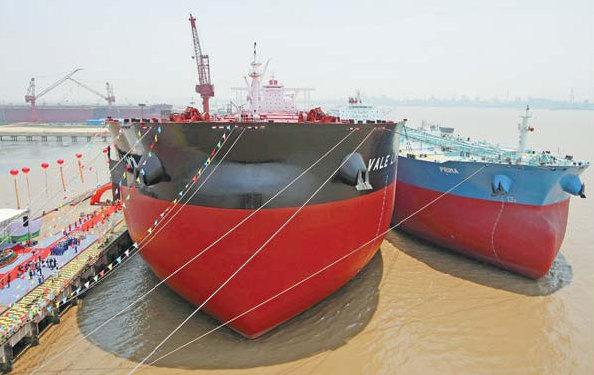
China’s Rongsheng Heavy Industries—the largest private shipbuilder in the world’s number one shipbuilding country—is in a bad shape. Struggling with plummeting orders and soaring debts, on Friday the company
Rongsheng reported a net loss of $93.5 million in 2012 and said—with no details provided—that it expects a further loss in the first half of this year. Its orders last year numbered just two, compared to 24 in 2011 and it recently
China’s shipbuilding industry body said on Thursday that a third of the country’s yards could close within five years if the global economy does not pick up. “Because of the overall market, there’s no way out for the companies, so only the strongest will survive,” an analyst at Masterlink Securities in Shanghai
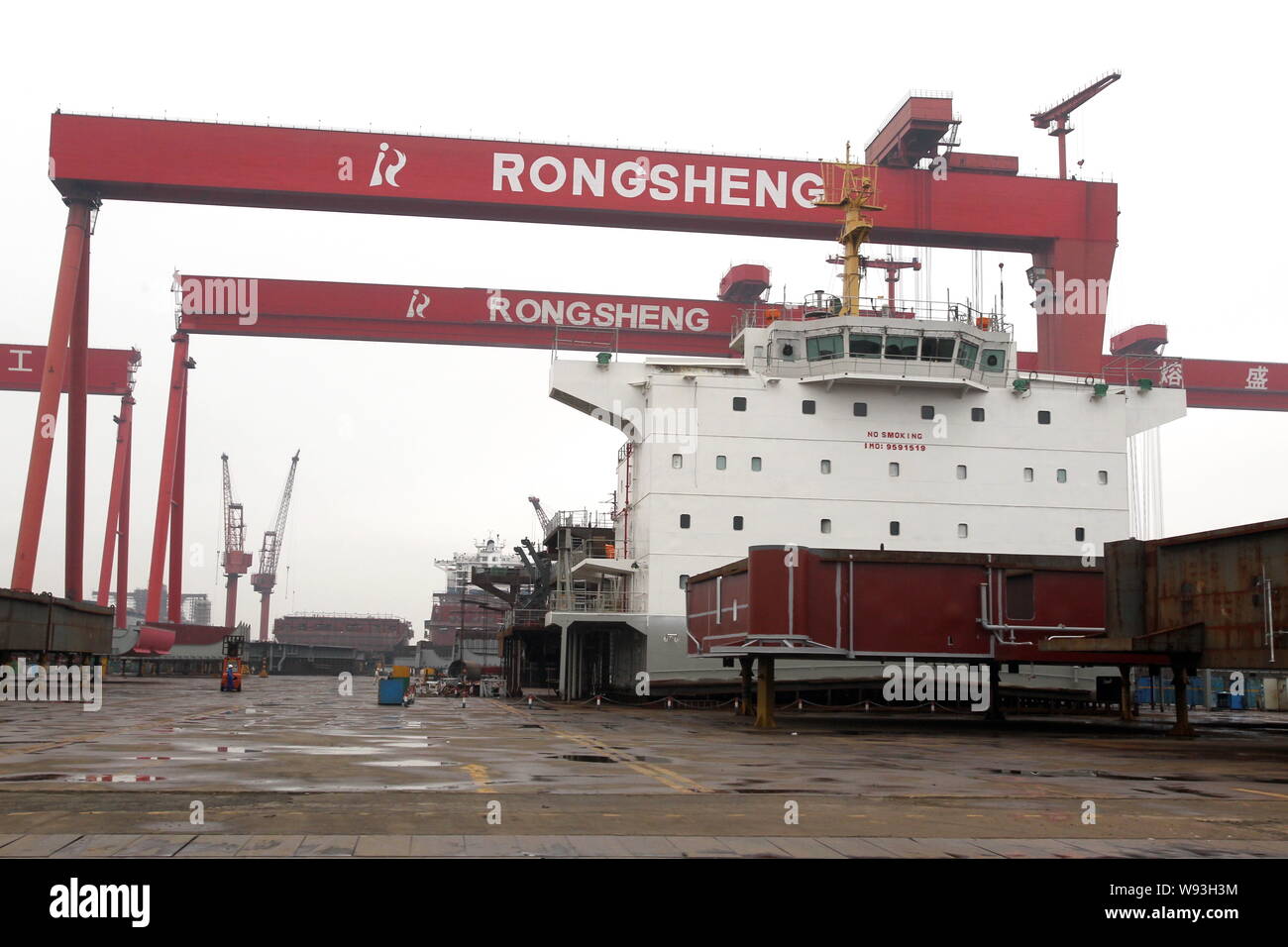
[Press Release]China Rongsheng Heavy Industries Secures Shipbuilding Contracts from Three Ship Owners* * * *Enhances Functions of the Vessel Models and Captures the GreenTrend in the MarketStrong Capability to Secure New Orders with Immense GrowthPotential
(3 July 2011, Hong Kong) China Rongsheng Heavy Industries Group Holdings Limited (China Rongsheng Heavy Industries or the Group; stock code: 01101.HK), a large heavy industries group in China, is pleased to announce that it has secured large orders from three renowned shipowners in Europe recently, including four
6600-TEU containerships and ten 205,000-tonne bulk carriers.Mr Chen Qiang, Chief Executive Officer and Executive Director of China Rongsheng Heavy Industries, said, We have secured the highest number of new orders in the country and the worlds fifth highest number of orders in hand since the end of 2010. Following the order[s] valued at USD400 million secured in the first quarter this year, we have secured several additional large orders which have notably increased the total amount of our orders in hand. These orders are sufficient to support our development in the coming few years, forming a solid foundation for our future growth. The signing of the contracts has increased the amount of new orders of the Group in the first half of the year to more than USD1.3 billion and further rationalised our order structure.
At the same time, China Rongsheng Heavy Industries has signed contracts with two other European ship owners to provide each with two 6600-TEU containerships [respectively]. Adopting a new generation design, the 6600TEU containerships reduce the speed from 25 kn to 21 kn as well as [ballast capacity], thus saving oil consumption and lowering transportation cost.
Despite the slowdown in the global shipbuilding industry in the first half of the year, China Rongsheng Heavy Industries has stood out among its peers in the volume of new orders it has secured. This year, the Group has signed contracts with Golden Union, a well-known international shipowner, for provision of two Panamax bulk carriers in January, and 2+2 of these carriers in May. Founded in 1977, Golden Union is well-known for operating bulk carriers. Currently, Golden Union has more than 20 ships in its fleet, thus making it the leader in the dry bulk carrier transportation [industry] in Greece.
Mr Chen concluded, Our improvement was by no means due to luck. The new orders that we just secured included some established and world renowned shipowners. These new orders represented their recognition of our rapid growth and appreciation of the top quality of our finished products, as well as their support and trust of the brand. Although the global shipbuilding market remains slow, our business has not been affected and we are boosting sustained and stable income growth as planned. In the near future, our strong ability to secure new orders should lead the industry to grow and come on the international stage. We are moving forward to become a leading heavy industries group and generate more promising returns for our shareholders and investors.
Established in 2005, China Rongsheng Heavy Industries advanced to become a market leader in the Chinese shipbuilding industry within five years. According to Clarkson Research, China Rongsheng Heavy Industries was the second largest shipbuilder and the largest privately-owned shipbuilder in the PRC in terms of total order book measured by DWT as of end of 2010, and had the largest shipyard in the PRC. China Rongsheng Heavy Industries was also a global leader in manufacture of VLOCs of over 400,000 DWT. Headquartered in Hong Kong and Shanghai, China Rongsheng Heavy Industries has production facilities in Nantong of Jiangsu Province and Hefei of Anhui Province. Currently, China Rongsheng Heavy Industries business spans four segments: shipbuilding, offshore engineering, marine engine building and engineering machinery. Rongsheng products include bulk carriers, crude oil tankers, containerships, offshore engineering products, low-speed marine diesel engines and small to mid-size excavators for construction and mining uses. It has established strategic cooperations with renowned international classification societies including DNV, ABS, LR, GL and CCS, and has built a customer base including enterprises such as CNOOC, Vale, Geden Line, Cardiff Marine Inc., MSFL and Frontline Ltd. The Groups products have been sold to 11 countries and regions including Turkey, Norway, Germany, Brazil, Singapore and China.For press enquiries:Strategic Financial Relations (China) LimitedMs. Anita CheungTel: (852) 2864 4827Email: anita.cheung@sprg.com.hk

Rongsheng has borrowed billions of dollars in debt since its launch in 2005, fueling a rapid expansion that has made it one of China"s biggest three shipbuilders. But a global slowdown in demand for new vessels over the past few years has hit the firm hard.
In July Rongsheng, which is owned by private investors, said it was in discussions with a number of banks about "renewing existing credit facilities." The company also said it has reached an accord with a company controlled by key shareholder
said in a written statement that a recovery in the shipbuilding industry is likely to be slow due to an imbalance between supply and demand. "Although the [shipbuilding] industry has recently showed positive signs that point to a rebound, neither new order price nor volume confirms a recovery," he said. "Shipbuilding companies still encounter difficulty in earning profits on orders."
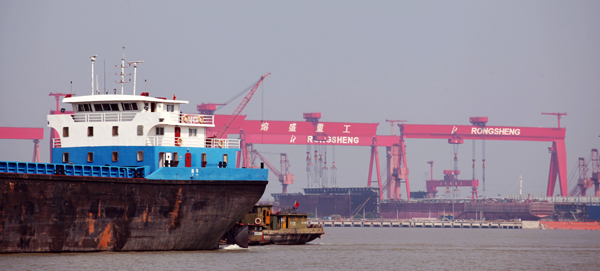
(Bloomberg) — China Rongsheng Heavy Industries Group Holdings Ltd., the shipbuilder whose woes made it a symbol of the country’s credit binge, said it planned to sell assets to an unidentified Chinese acquirer.
The company intends to sell the core assets and liabilities of its onshore shipbuilding and offshore engineering businesses, according to a statement to the Hong Kong exchange Monday. Rongsheng’s shares, which were halted March 11, will resume trading on March 17.
Once China’s largest shipbuilder outside government control, Shanghai-based Rongsheng has been searching for funds after orders for new ships dried up and the company fell behind on principal and interest payments on 8.57 billion yuan ($1.4 billion) of bank loans. Rongsheng’s struggles illustrate the difficulties shipbuilders face in competing with state-owned yards that have government backing and easier access to funds.
Rongsheng and the proposed buyer have entered into an exclusivity period while assets and liabilities are valued, according to the statement. The agreement will expire on June 30, the company said.
Rongsheng said March 5 it wouldn’t proceed with a proposed warrant sale after Kingwin Victory Investment Ltd. owner Wang Ping — a potential investor who had pledged as much as HK$3.2 billion ($412 million) — was said to have been detained.
Yangzijiang Shipbuilding Holdings Ltd. said previously it had been approached by China’s government about buying a stake in Rongsheng, and that no decision had been made. Yangzijiang Chief Financial Officer Liu Hua said today that the company isn’t involved in the agreement announced by Rongsheng, according to the company’s external representative.
Rongsheng has sought help from the government to benefit from a rebound in China’s shipbuilding industry — the world’s second biggest — after cutting its workforce and running up debts amid a global downturn in orders.
As orders for new ships began to dry up, China in 2013 issued a three-year plan urging financial institutions to support the shipbuilding industry. Ship owners placing orders for China-made vessels, engines and some parts should get better funding, the State Council said. A third of the more than 1,600 shipyards in China could shut down in the next five years, an industry association predicted earlier.
In September, the government responded by listing Rongsheng’s Jiangsu shipyard unit among 51 shipbuilding facilities in China deemed worthy of policy support as the industry grapples with overcapacity.
Some of Rongsheng’s subsidiaries, including Hefei Rong An Power Machinery Co. and Rongsheng Machinery Co., signed agreements with domestic lenders, led by Shanghai Pudong Development Bank, to extend debt repayments to the end of 2015, the company said in October.

Rongsheng Heavy Industries Group Holdings Ltd"s shares have been suspended on the Hong Kong Stock Exchange after a media report said that the company cut 8,000 jobs in recent months.
Rather than building cheap bulk carriers, many Chinese shipbuilders are keen to upgrade their product focus from shipbuilding to offshore engineering products, such as offshore drilling rigs, wind turbine installation vessels and offshore pipe-laying vessels.
Last year, Rongsheng Offshore & Marine was established in Singapore to seek new market growth points. Its business segments include shipbuilding, offshore engineering, marine engine building and engineering machinery.
"Due to the low pre-payment rates and delayed deliveries, many shipbuilding companies in Shanghai, Nantong and Zhoushan are experiencing a shortage of capital. Banks are not willing to lend to shipbuilding companies because they"re fully aware of how sluggish the business is. Shipbuilding is listed as a high-risk industry by banks," Meng said.
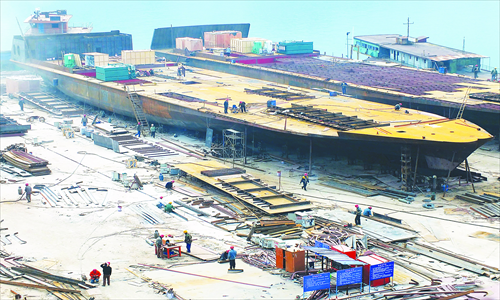
Rongsheng return: Ex-Chinese shipbuilder Jiangsu Rongsheng Heavy Industries is apparently making a comeback. The Nantong-based yard was once China’s largest privately owned shipyard but the debt-laden yard exited the shipbuilding business in 2014 following the global financial crash. But this week it inked a letter of intent for 10 bulker newbuildings with Greek shipowner George Economou’s Cardiff Marine. Sources said that Rongsheng’s chief executive David Luan has been rehired to restart Rongsheng.

China Rongsheng Heavy Industries Group, one of the leading shipyards in China, warned of a net loss for 2012, due to a sharp decline in orders and new vessel prices, according to a company filing with the Hong Kong Stock Exchange on December 24.
The number of Rongsheng"s employees has dropped to around 10,000 from nearly 50,000 at the peak time for the industry several years ago, according to a report from Guangzhou-based 21st Century Business Herald on December 27, citing workers from Rongsheng.
Wu Jiawei, a 20-year-old electrician who works at a Rongsheng shipyard in Nantong, East China"s Jiangsu Province, said he is planning to leave his current position after the Spring Festival in February, after he gets the year-end bonus.
A PR employee at Rongsheng"s Shanghai headquarters, who declined to be named, admitted that some employees have left the firm amid the gloomy industry prospects.
He told the Global Times that the company"s number of employees was now stable. "The total number of employees at Rongsheng was 25,000 during the peak time several years ago, not 50,000 as reported, and at present Rongsheng still has a total of around 20,000 employees."
Lu Jian, a former co-worker of Wu"s at Rongsheng"s Nantong shipyard, told the Global Times that the reason he left the company in February 2012 was because he "basically had nothing to do every day."
Rongsheng received only two new orders in the first half of 2012, and the prices of the orders were substantially lower than before, according to the PR employee.
Rongsheng is not the only shipbuilding company to be hit by the industry downturn. Media reports have said that many privately owned small shipyards in Jiangsu and Zhejiang provinces have partly halted production amid the downturn.
China CSSC Holding, a State-owned shipbuilding company, also reported on October 30 an 87.34 percent drop in third-quarter net profit to 70.49 million yuan.
He also noted that ship buyers have started to push down prices amid the sluggish demand, and Rongsheng is responding by turning to marine engineering, such as producing equipment for offshore oil exploration.
Rongsheng Offshore & Marine, a subsidiary dedicated to the marine engineering business, was established in Singapore in October 2012, and it announced that it had already secured an order from a Singaporean client.
Other shipbuilding companies such as COSCO Shipyard Group and Jiangsu-based Mingde Heavy Industry also announced similar strategies over the past two years.
In the first 11 months of 2012, China"s 1,647 shipyards reported combined profits of 23.4 billion yuan, down 37 percent year-on-year, the latest data from the China Association of the National Shipbuilding Industry (CANSI) showed.
Most domestic shipbuilding companies are now relying on the unfinished orders obtained during the past two years, but the industry is expected to see an increase in terms of new orders in 2013, according to Zhou.

Chinese shipbuilder Rongsheng expects to deliver this year the majority of the 12 very large ore carriers (VLOCs) ordered by Brazilian mining giant Vale(NYSE: VALE) for US$1.6bn, the former"s CEO Chen Qiang was reported as saying by international press. Rongsheng plans to deliver two VLOCs originally due last year to Vale in the next two months and all but one of the remaining vessels by late-2012. The last carrier will be delivered in 2013, according to press reports. Vale"s VLOCs, also known as Valemaxes, can transport 400,000t of iron ore. The miner also has an order for seven more VLOCs with South Korea"s Daewoo Shipbuilding & Marine Engineering for US$748mn. The vessels were commissioned in an effort to lower international freight costs, which had been weighing on margins. In addition to the 19-strong fleet, Vale has ordered another 16 ships with the same dimensions that will operate exclusively for the company in long-term contracts with shipbuilders. ACCESS TO CHINA In early February China"s transport ministry announced a ruling that restricts ports" right to accept many of these vessels, prompting analysts to speculate that Vale would no longer be able to make full use of its VLOCs. Although Vale has said its Asia shipments will not be affected by the ruling, the company is reportedly in talks with Chinese authorities to obtain access for its VLOCs at the Asian country"s ports. Rio de Janeiro-based Vale is the world"s largest iron ore producer and exporter.




 8613371530291
8613371530291